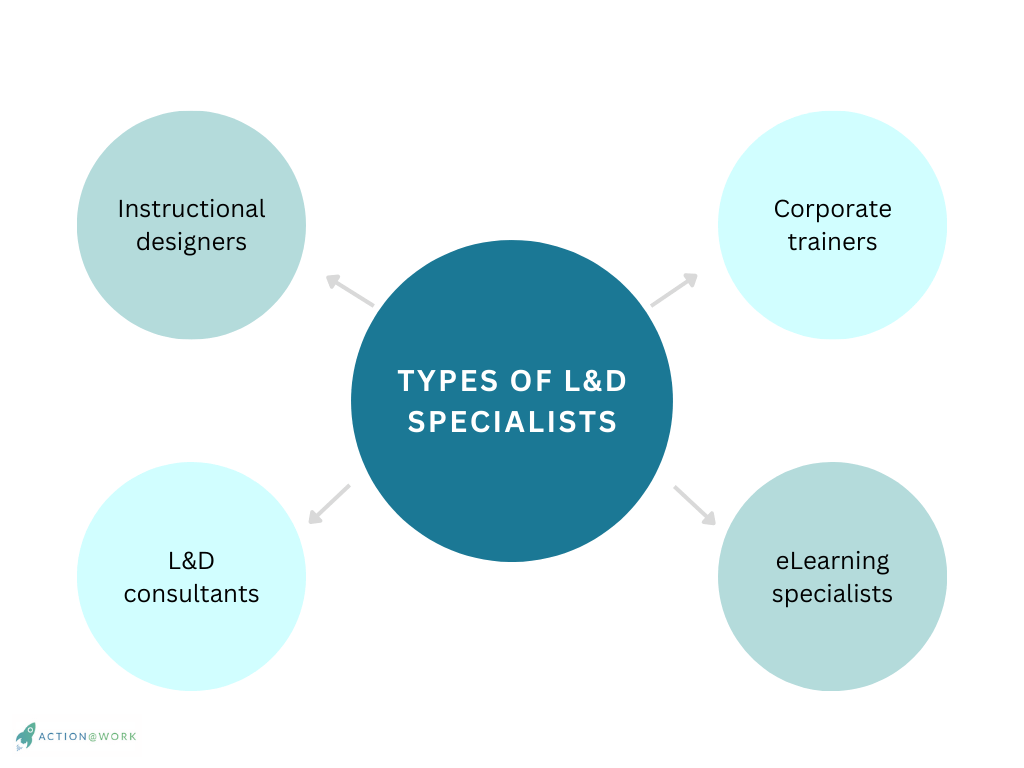Recent research by the Training Industry 1 revealed that the corporate training sector is valued at 357.7 billion (yes, billion) US dollars. And as it grows from strength to strength, there’s an increasing demand for skilled learning and development specialists.
But what does this role involve, and what key skills do you need to succeed? That’s what I’ll cover in this guide.
Whether you’re thinking about pursuing a career in L&D or are ready to make a career shift, you should take a look at this article. I’ve put together everything you need to know about becoming a learning and development specialist.
Keep reading to discover:
- What is a learning and development specialist?
- The main roles and responsibilities
- Qualifications and required skills
- Salary and career outlook
What is a Learning and Development Specialist?
A Learning and Development (L&D) Specialist is a training professional who takes charge of the full employee education process in an organization.
This is a varied role that changes depending on the type of organization. As such, L&D specialists must have a broad skill set. These include instructional design models, adult learning theory, and conducting training needs analysis.
We’ll get into the different types of L&D specialists in the next section.
Types of L&D specialists and their salaries
Not every organization has the same training model or needs. So, L&D pros need to adapt to meet their company’s goals. The industry you work in will also impact your skill set.
As a result, there’s a broad array of specializations you can take as an L&D professional. Let’s take a closer look at some of the most common.

Corporate trainer
Corporate trainers facilitate and deliver employee education programs, including workshops and classroom sessions. They are responsible for assessing what areas staff need training on, developing the curriculum, and evaluating the outcomes.
With that in mind, you need to be a strong communicator and public speaker to excel in this role. You’ll also need to develop expertise in the processes, products, and soft skills you train on.
Best suited to:
- Strong communicators who love face-to-face interaction and know how to engage an audience.
Average salary:
- Corporate trainers have an average yearly salary of $58,280. (Source: Indeed)
Elearning specialist
As the name suggests, eLearning specialists are the brains behind digital learning experiences. They use ed-tech tools to design and deliver online courses for corporate training, academic education, and many other use cases.
To be excellent in this role, you need to have strong tech skills and an eye for design because you’ll be writing video scripts, creating multimedia content, and designing visuals for courses.
In particular, you’ll need to know your way around eLearning authoring tools and other multimedia development tools. A solid understanding of adult learning principles is also a big plus.
Best suited to:
- Creative, tech-savvy people with a passion for education.
Average salary:
- In the US, the average yearly salary for an eLearning specialist is $62,110. (Source: salary.com)
L&D consultant
As a consultant, you offer your expertise and experience to advise an L&D department on strategy. This is a more high-level role that focuses on conducting training needs assessments, aligning strategies with business goals, and allocating resources.
You will also use your experience to evaluate the effectiveness of training initiatives in your organization and suggest relevant solutions.
You’ll typically require solid experience in L&D strategy development to succeed in this role. A deep understanding of the business and its functions is also a big plus.
Best suited to:
- Seasoned learning and development specialists with strong analytical and strategic thinking skills.
Average salary:
- L&D consultants earn an average yearly salary of $86,000 in the US. (Source: Indeed)
Instructional designer
Instructional designers (IDs) act like architects, laying each brick of an online learning experience. Starting with conducting a training needs analysis, they take charge of defining the learning goals, choosing the delivery method, and working with SMEs to determine the content.
Since this role requires a fair deal of juggling, IDs need a varied skill set. As well as a strong understanding of instructional design models and theories, you must also be proficient in eLearning tools and able to manage projects.
Best suited to:
- People who like to mix their love of education with cutting-edge technology.
Average salary:
- Instructional designers in the US earn an average yearly salary of $71,472. (Source: Indeed)
One of the most common questions about these different roles is:
What’s the difference between an instructional designer and an eLearning specialist?
Here’s a quick breakdown of how they differ and where they overlap:
Instructional designers look at the big picture, assessing what needs to be learned, how to present it, and how effective the training is. They will work closely with SMEs to piece this all together and come up with a training plan.
On the other hand, eLearning specialists focus on the delivery. Most of the time, they’ll collaborate with the instructional designer to bring their vision to life using their technical skills in multimedia development.
While there’s plenty of overlap (both use instructional design models and principles and authoring tools), that’s a general idea of how the roles differ in focus.
Main responsibilities
The exact scope and responsibilities of any job role can vary depending on the organization, sector, and seniority level of the position.
Having said that, there are some core responsibilities that most learning and development specialists will cover. These include:
- Conducting training needs assessments
- Identifying skills gaps at an organizational and individual level
- Setting learning goals and objectives
- Aligning development programs with organizational goals to deliver targeted employee training
- Working with SMEs and internal stakeholders to determine key training areas
- Facilitating training workshops and other employee education initiatives
- Tracking training budgets and negotiating contracts
- Designing and delivering eLearning courses using instructional techniques and learning models
- Supporting managers in designing personalized development career paths
- Managing an LMS and extracting reports to measure training impact
- Assessing the success of development plans and calculating training ROI
Key skills and qualifications
Once you’ve decided what type of learning and development specialist you want to be (or transition to), you’ll need to develop the core competencies for the role. Again, these look different for each role, industry, and organization. But there are some technical and soft skills that most L&D pros will need. These include:
| Soft skills | Technical skills |
|---|---|
| Communication | Instructional design models, principles, and best practices |
| Project management | Conducting training needs assessments |
| Time management | Basic video production and graphic design skills |
| Creative problem solving | Proficiency in eLearning tools and an LMS (and performance management software for some roles) |
| Goal setting | Basic understanding of data analytics |
| Empathy (ability to empathize with learners) | Curriculum development |
The good news is that most of these core competencies are learned on the job, meaning you don’t need a degree or qualification to break into the field.
Although, it does help.
According to Devlin Peck’s hiring manager report, 44.6% of hiring managers prefer candidates with a bachelor’s degree. But many will forgo this if a candidate has a strong portfolio or relevant professional experience.
For more technical roles, like IDs or eLearning specialists, a portfolio and proficiency in key industry tools are usually enough to land you a role. There are also plenty of professional courses to showcase your skills and make you stand out.
For more senior roles like L&D consultants or managers, previous experience is essential. You’ll need to have a proven track record of leading an L&D function, but are likely to need some of the more technical skills listed above.
The best way to know what qualifications you need is to browse job ads on LinkedIn to see what recruiters are looking for.
Career outlook
AI has got many of us worrying about our jobs and the future of our industries. It’s also become a major consideration for graduates starting out and those thinking about a career change.
So, what’s the career outlook for L&D professionals?
The Bureau of Labor Statistics predicts that employment of training and development specialists will grow 6% by 2032.
That would equate to around 35,400 new job openings each year. For context, that number is above average for all occupations.
These figures suggest that the demand for training and development pros will remain high for the foreseeable future.
Another important factor to consider here is the scope for growth. The wide array of specializations within this field means there are plenty of chances to progress.
For instance, experienced L&D specialists may eventually become consultants, lending their expertise to enterprises.
Another example is junior and mid-level professionals moving to another industry and gaining sector-specific skills and expertise.
With the rise of distance learning, learning and development specialists who currently oversee in-person training may need to upskill to move into more digital-based roles.
Finally, there’s also room for corporate trainers or curriculum developers to transition into instructional design or eLearning development roles.
Final thoughts
Learning and development specialists power employee education in an organization. From assessing what training staff needs to developing learning materials, they wear a lot of hats. As such, if you’re thinking of pursuing this as a career, you’ll need to hone those core competencies.
With a rapidly growing industry and plenty of scope to grow, it’s a promising career path for anyone interested in continuous learning and development in a corporate environment.

By Nicola Wylie
Nicola Wylie is a learning industry expert who loves sharing in-depth insights into the latest trends, challenges, and technologies.
- https://trainingindustry.com/wiki/learning-services-and-outsourcing/size-of-training-industry/ ↩︎
